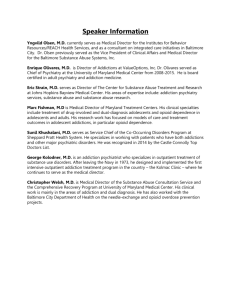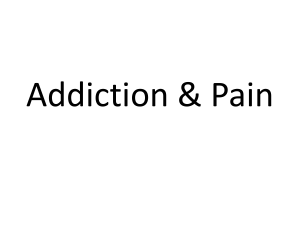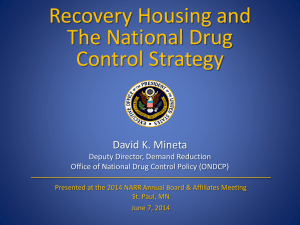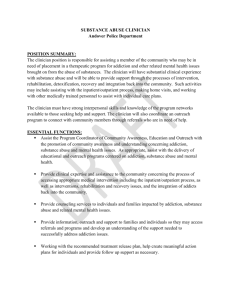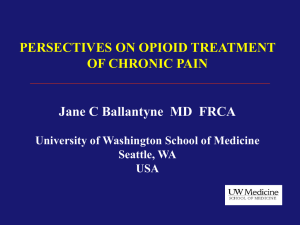Addiction Medicine Services
advertisement
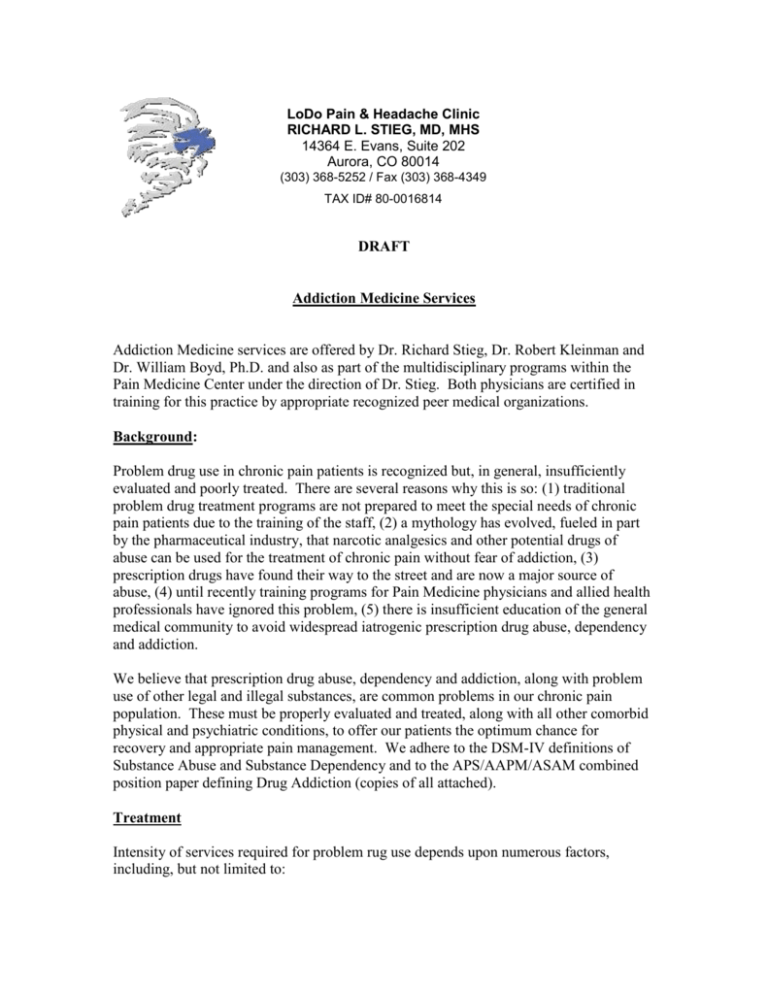
LoDo Pain & Headache Clinic RICHARD L. STIEG, MD, MHS 14364 E. Evans, Suite 202 Aurora, CO 80014 (303) 368-5252 / Fax (303) 368-4349 TAX ID# 80-0016814 DRAFT Addiction Medicine Services Addiction Medicine services are offered by Dr. Richard Stieg, Dr. Robert Kleinman and Dr. William Boyd, Ph.D. and also as part of the multidisciplinary programs within the Pain Medicine Center under the direction of Dr. Stieg. Both physicians are certified in training for this practice by appropriate recognized peer medical organizations. Background: Problem drug use in chronic pain patients is recognized but, in general, insufficiently evaluated and poorly treated. There are several reasons why this is so: (1) traditional problem drug treatment programs are not prepared to meet the special needs of chronic pain patients due to the training of the staff, (2) a mythology has evolved, fueled in part by the pharmaceutical industry, that narcotic analgesics and other potential drugs of abuse can be used for the treatment of chronic pain without fear of addiction, (3) prescription drugs have found their way to the street and are now a major source of abuse, (4) until recently training programs for Pain Medicine physicians and allied health professionals have ignored this problem, (5) there is insufficient education of the general medical community to avoid widespread iatrogenic prescription drug abuse, dependency and addiction. We believe that prescription drug abuse, dependency and addiction, along with problem use of other legal and illegal substances, are common problems in our chronic pain population. These must be properly evaluated and treated, along with all other comorbid physical and psychiatric conditions, to offer our patients the optimum chance for recovery and appropriate pain management. We adhere to the DSM-IV definitions of Substance Abuse and Substance Dependency and to the APS/AAPM/ASAM combined position paper defining Drug Addiction (copies of all attached). Treatment Intensity of services required for problem rug use depends upon numerous factors, including, but not limited to: Addiction Medicine Services Page 2 Treatment 1. Intensity of services required for problem drug use depends upon numerous factors, including, but not limited to: (1) severity of comorbid physical and psychiatric illness. (2) necessity for ongoing pain management services, including continued use of longacting opioids, when appropriate, psychological support and psychiatric medications. (3) patient willingness to recognize problem drug use and to change and (4) availability of specialty services. Medical and psychological/psychiatric evaluation includes: (1) interview and psychological testing designed to identify problem substance use and patient readiness to change (2) urine drug screens, routinely obtained during evaluation and frequently during treatment to assess treatment compliance and identify unreported substance use, (3) inpatient detoxification services, when appropriate, are utilized at neighboring facilities under the direction of physicians who are especially aware of the problem with dual diagnosis (chronic pain and problem substance abuse) patients, (4) immediate follow up with continued pain management and psychological support services to limit the risk of recidivism and to continue the pain rehabilitation effort. The problem of opioid abuse, dependence and addiction in the chronic pain patient requires special expertise in determining: 1. Whether there is a need for continued opioid use in the face of the drug problem. Patients requiring continued use of opioid analgesics can usually be switched from their current opioids to a single opioid agonist/antagonist drug, Suboxone, which has multiple advantages over other short and long-acting opioids. This includes increased safety, ease of administration and virtual absence of abuse and diversion potential. We have had considerable success with this drug over the past two years, both as a potent analgesic and as a viable outpatient treatment for opioid addiction. Its use for the purpose of treatment of addiction requires a special DEA license, which is held by Dr. Stieg. 2. Level of care, including inpatient services, required. 3. A long-range treatment plan to control both the ravages of chronic pain and problem substance use. Most patients can be managed on an outpatient basis with the help of both in-house multidisciplinary services (e.g., psychology and common nursing) and community services (e.g., AA, NA). . Our practices allow us only to evaluate and treat problem drug use in patients suffering with chronic pain at this time. Appointments should be made through Fran Tafuro, R.N. at 303-368-4500
